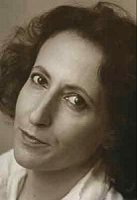1. Bella Ciao
2. Voglio Una Casa
3. Per Vita Bella
4. Ah, Vita Bella
5. La Luze De Oro
6. C’ere Una Volta
7. Una Serenata
8. Stornelli A Saltraello
9. Per La Ninna Nanna
10. La Muntagnella
11. La Tarantelle Translucida
12. Per Gorizia
13. Gorizia
14. Rosso
Lucilla Galeazzi: vocals
Vincent Courtois: violoncello
Michel Godard: tuba, serpent
In his linear notes to Trio
Rouge, Ralf Dombrowski, the producer of
the album, recounts his memories of the Talos
Jazz Festival - the venue in which this unusual
group first came to his attention. Due to
bad weather, he tells us, the concert was
shifted from the great outdoors to the ugly,
functional civic centre. Naturally, the mood
of the day was dampened - and the cello/tuba/vocals
combination that had just stepped on to the
stage  offered
little promise of cheering things up. But,
as Dombrowski himself describes it, the discontent
was not to last long: ‘when Lucilla Galeazzi
[left] began to sing
the sober surroundings were forgotten... The
crowd went wild and I was impressed.’
offered
little promise of cheering things up. But,
as Dombrowski himself describes it, the discontent
was not to last long: ‘when Lucilla Galeazzi
[left] began to sing
the sober surroundings were forgotten... The
crowd went wild and I was impressed.’
Galeazzi, indeed, has one
of those voices that instantly grabs the listener
- rich, intense and filled with emotion, but
never straying from a breathtaking precision
that shines of musicality. And like all great
musicians, she employs her talents with the
utmost versatility. Passion and defiance seep
through every note of songs like ‘Voglio Una
Casa’, whilst sensitivity and tenderness characterise
‘Per Vita Bella’. The most impressive tune
of the collection is the short but absorbing
‘Stornelli A Saltrarello’. Accompanied only
by steady clapping, Galeazzi’s expressive
vocals glide with ease through the rhythmical
mesh of this beautiful traditional melody.
The rapid blast of notes at the end has to
be heard to be believed...
And so does Michel Godard
on tuba. As uninspiring as the instrument
may be in the hands of the average performer,
Godard’s virtuousity is an utter delight to
listen to. Attaining an almost voice-like
quality, bending and stretching the notes
like elastic, his solos breath tremendous
life in to the sparse compositions of the
trio. Experimental as he often is, though,
Godard never allows his talents to compromise
the tone and feel of the songs. His solos
often work round the melody already laid down
by the vocals, whilst in songs like ‘Una Serenata’
he shows his willingness to stick very rigidly
to the simple, thumping bass line required
to carry the tune forward.
It is Courtois, of course,
who by-in-large provides the ‘rhythm section’.
Whether strumming at pizzicato chords or sawing
away at a riff, his rhythmic assurance and
precise approach do away with the need for
percussion. In saying this, his more melodic
work is also extremely impressive, bringing
a depth and richness to the pieces, as well
as a haunting quality.
There can little doubt, then,
that Trio Rouge is a brilliant musical
accomplishment - original, warm and highly
absorbing. The only thing that concerns me
in making my recommendation is that ‘jazz’
is a rather misleading term to describe this
form of music. Whilst a jazz-like freedom
seeps through the work - as does a jazz-like
understanding of harmony - don’t be expecting
any walking bass lines, swinging melodies
or toe-tapping beats. These are sparse, intense
compositions rooted in a spirit of traditional
folk songs... Still, to the open-minded jazz
fan, the new experience will no doubt satisfy.
Robert Gibson